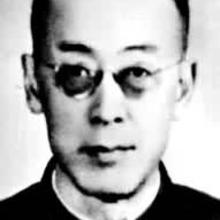
M.A., Sociology, 1925
Ph.D., Sociology, 1928
Wu Ching Chao, who was born in 1901 in Anhui, enrolled at the University of Minnesota in 1923. He received a bachelor of arts from in 1925 and then enrolled at the University of Chicago to study sociology where he received a master of arts in 1926 and a doctoral degree in 1928. Wu’s book “Chinatowns: A Study of Symbiosis and Assimilation,” and dissertation at the University of Chicago, “Chinese Immigration in the Pacific area” are considered early significant works in investigating the unusual difficulties faced by Chinese communities in the U.S.
Upon returning to China, Wu became a prominent sociologist and one of the most important representatives in Chinese urban sociology. In 1928, Wu served as a professor at Jinling University in Nanjing and as the chair of the department of sociology. In 1931, Wu became a professor at Tsinghua University and at the same time served as the director of academic affairs. In 1935, Wu served as a secretary for Administrative Council of Republic of China. He also served as a professor in sociology at Tsinghua University, Central University of Finance and Economics, and Renmin University of China.
Wu published numerous articles and several books including “Social Organizations,”“Urban Sociology,” “Biological Foundations of Society,” “The Fourth Type of Nations,” and “Jie Hou Zai Li.” His analysis of Chinese society has offered in depth insights to a better understanding of the Chinese land system, industrialization, and resource distributions.
Photo Source: www.baidu.com
吴景超,1901年生于安徽,1923年入学到明尼苏达大学,并于1925年获得社会文学和艺术学院的学士学位。吴景超随后赴芝加哥大学攻读社会学,于1926年获得硕士学位,1928年获得博士学位。他在芝加哥大学期间出版了题为《Chinatowns: A Study of Symbiosis and Assimilation” 的文集,他的博士论文题目为《Chinese Immigration in the Pacific Area》,这两部著作是早期探索美国中国移民生活的重要研究。
回国后,吴景超成为一位杰出的社会学家,他被视为中国研究都市社会学最主要的代表人物。1928年,吴景超任南京金陵大学社会学教授并兼任社会学系主任。1931年,他任清华大学社会学教授并担任教务长。1935年,他任中华民国行政院秘书。自1947年后,他先后任教于清华大学,中央财经大学和中国人民大学。
吴景超发表过大量文章并出版了数本极具影响力的专著,其专著包括《社会组织》(1929)、《都市社会学》(1929)、《社会的生物基础》(1931)、《第四种国家的出路》(1936),和《劫后灾黎》(1947)。吴景超对中国社会的分析帮助人们更好地理解中国的土地制度、工业化、和资源配置。然而,他的观点在文化大革命期间被视为资本主义社会学,吴景超也因此被划为右派而遭到迫害。1980年,吴景超得以平反。
